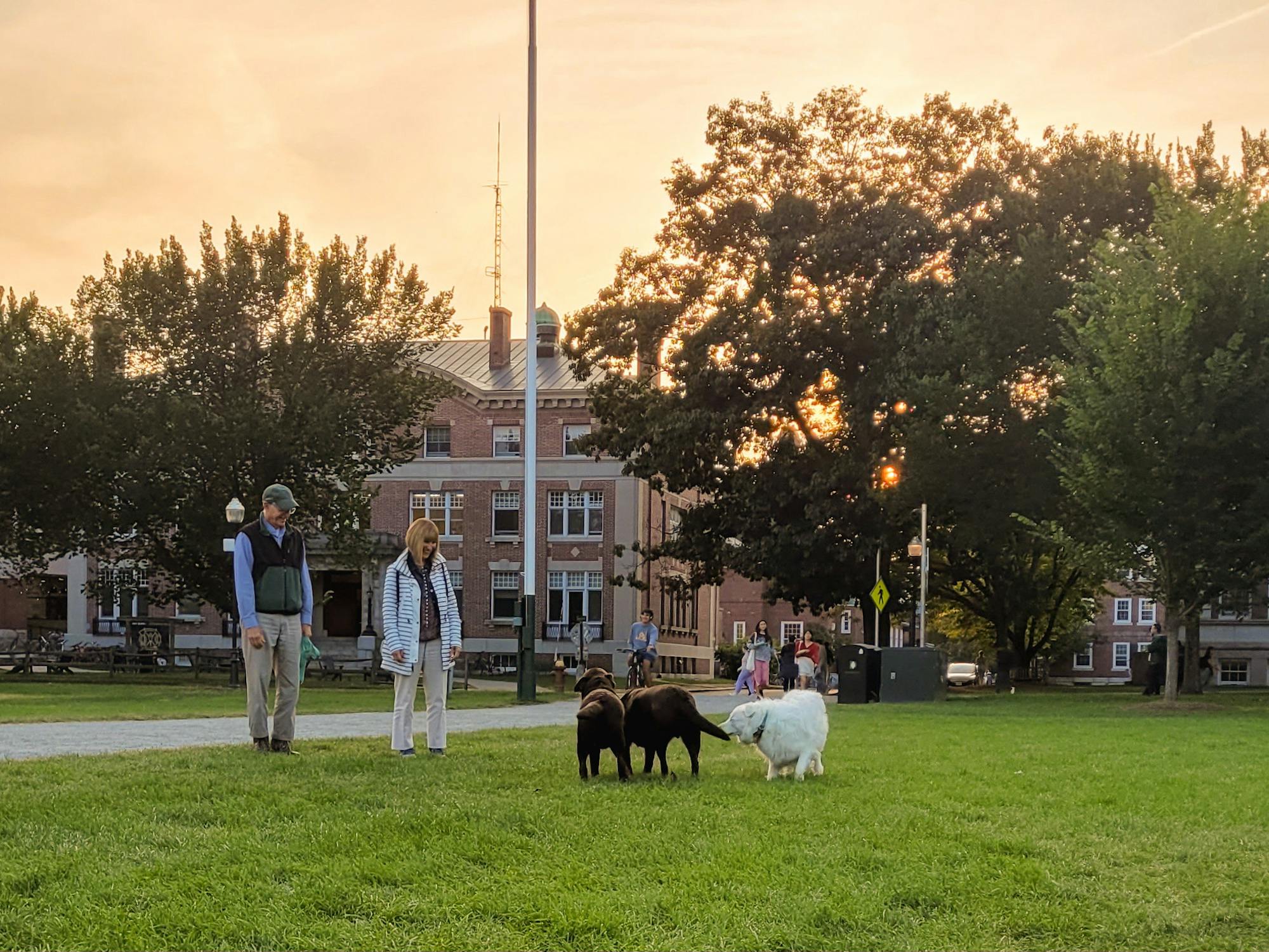In any context, caring for a dog takes a lot of patience, perseverance and responsibility. Such virtues are tested when it comes to owning a dog in a college environment. In fact, quite a few Dartmouth fraternities are home to canine companions. This week, Mirror investigated how various brothers care for their dogs in their social spaces.
Phi Delta Alpha brother Matthew Lamberth ’24 had experience owning dogs but had always wanted a specific breed: a Samoyed. When Lamberth joined Phi Delt his sophomore year, that dream of owning a Samoyed came true. With input from other brothers, he decided on Koda — 55 pounds, fluffy and stark white — whose name means “little bear.”
According to Lamberth, taking care of Koda in college is similar to taking care of his pets at home, but with added duties.
“In college, it’s a more direct responsibility than my life at home. At home, I have my family to help out,” Lamberth said. “[At college], Koda is primarily under my care. So that means waking up at 7 a.m every day. That means three to four walks every day.”
Keeping with Phi Delt customs, every rush class chooses a house dog, and one person is elected to take care of it. Any brother could throw his hat into the ring, and the process to elect the dog’s primary owner is entirely electoral, voted on by the brothers. Lamberth was elected to be the dog’s primary owner, but he also has a secondary helper who was elected to support Koda when Lamberth gets busy. However, Lamberth stated that — even though he does have help — being Koda’s primary caregiver means a lot of sacrifice.
“Koda’s well-being comes before a lot of other things,” Lamberth said. “It comes before going out at night. If he were to be sick, it comes before class. So, it’s a lot of responsibility.”
One of Koda’s fellow canines on campus is Bodi, an Australian Shepherd, belonging to Theta Delta Chi brother Parker Jones ’24.
Jones knew from very early on as a member in TDX that he wanted to have a position in the fraternity. Combined with his love for dogs and support from friends, Parker sought to become the dog chair for TDX. He has found that his brothers love bonding with Bodi, especially during sophomore summer.
“Sophomore summer was a big time when everyone in the frat interacted with Bodi,” Jones said.
Bodi, for the most part, has lived in off-campus housing with Jones and not in the fraternity house itself. Similarly, Koda lives in Lamberth’s senior apartment.
Lamberth highlighted the separation he feels between caring for a dog in a frat compared to caring for one at home. According to him, the large crowds that often come and go from the fraternities could, if handled incorrectly, confuse and scare the dogs. However, Lamberth stressed that they have yet to encounter seriously stressful situations with crowds due to the careful boundaries they set for Koda, as well as Buddy, Phi Delt’s in-house dog.
According to River Road Veterinary Clinic veterinarian Chris Dutton, successfully caring for a dog has to do with fostering social interactions for it. According to Dutton, historically, dogs have been domesticated due to their ability to adapt to humans in their social structure.
Considering that fraternities are constantly full of social interaction, Dutton stated that he believes that a dog can be happy within a frat, as long as it is raised in conditions that enable it to thrive.
“If the dog has a trusted leader in a human or another dog, then that’s what gives them comfort,” Dutton said. “Dogs need some type of leadership in their life to help them be comfortable and retain stability.”
Dutton mentioned that he sees college students’ dogs in his veterinary office, and the majority appear to be healthy and thriving.
Both Lamberth and Jones commented on how communication is key to maintaining that the dogs have a regular schedule.
“It’s a lot of setting boundaries,” Lamberth said. “Buddy, who lives in the house, goes to bed at 8 p.m. every night. People know that you don’t come in after 8 p.m. You don’t come expecting to see Buddy or bring friends to see him after 8.”
Jones said he is focused on Bodi’s needs, which has created a good environment for him. Bodi is a rescue dog, and, like many other rescues, he struggles with some anxiety and PTSD-related issues — specifically, a fear of separation.
“I think [the dog’s experience] is very dependent on listening to the dog and making them the most comfortable they can be,” Jones said.
Lamberth stated that Koda has enriched his relationships with his brothers, as well as adding to his life
“Dogs are a unifying factor throughout the brotherhood,” Lamberth said. “Visitors like spending time with them. And for me, personally, having Koda is a relaxing aspect of my time here.”
Similar to Lamberth, Jones says that most college students enjoy seeing Bodi around and have offered to help take care of him.
“Luckily, most college kids love dogs and want to be around them,” Jones said. “So people are always down to go walk with him.”
Lamberth said taking ownership of a dog in a frat is not going to be an easy task, but that it has provided a positive experience so far.
Undoubtedly, for the fraternities on campus, these dogs are as much a part of the brotherhood as any other human brother. Especially to their primary caretakers, these dogs will continue to be greatly loved outside of the walls of the fraternity house and their time here at Dartmouth.
“I love dogs,” Lamberth said. “And Koda is not a novelty, he is a companion animal that I value more than words. Having that in college is huge. And he’s coming with me after.”




